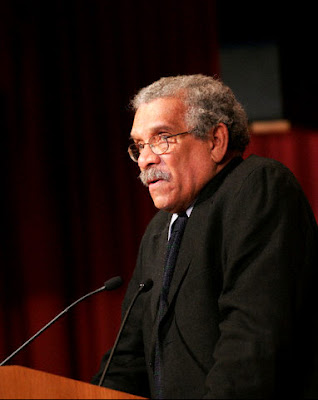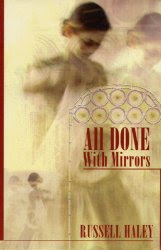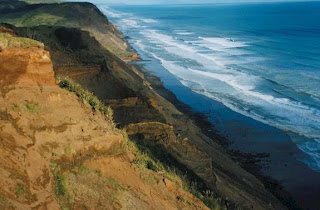I was scrolling around on facebook the other day when I found a post by our own great Pacific writer and poet Albert Wendt mentioning the recent deaths of two artists who had helped to shape his "heart and mind and imagination": Chuck Berry and Derek Walcott. Certainly I like Chuck Berry - who doesn't? But Derek Walcott: that really did hit home.
For quite a few years now I've been finishing the poetry section of my introductory Creative Writing course at Massey with a poem by Derek Walcott. I first encountered his work in the 1980s, when I was studying in the UK, and I still have the audio recording I made then of a dramatised reading of his long poem-sequence "The Schooner Flight" on BBC radio.
I still think that poem is his masterpiece. I enjoyed Omeros and many of his other long poems, but the voice of Shabine the sailor as he criss-crosses the Caribbean, moving in and out of islands and history with equal ease, seems to me to combine all his poetic virtues into one small compass.
Here's the part of the poem I read out to the stage one students:
from Fight with the Crew
... Had an exercise book,
this same one here, that I was using to write
my poetry, so one day this man snatch it
from my hand, and start throwing it left and right
to the rest of the crew, bawling out, ‘Catch it,’
and start mincing me like I was some hen
because of the poems. Some case is for fist,
some case is for tholing pin, some is for knife –
this one was for knife. Well, I beg him first,
but he kept reading, ‘O my children, my wife,’
and playing he crying, to make the crew laugh;
it move like a flying fish, the silver knife
that catch him right in the plump of his calf,
and he faint so slowly, and he turn more white
than he thought he was. I suppose among men
you need that sort of thing. It ain’t right
but that’s how it is. There wasn’t much pain,
just plenty blood, and Vincie and me best friend,
but none of them go fuck with my poetry again.
That last line always gets a gasp: poetry is seen as such a weak, flowery thing by so many people who aren't very familiar with it - but it's serious business to those who live by it, and Derek Walcott was definitely one of them.
Here's my own list of the books I have by him. It's not complete by any means, but I think I have most of his work, with the exception, maybe, of some of his - many - plays:
Derek Alton Walcott
(23 January 1930 - 17 March 2017)
- In a Green Night: Poems 1948-1960. 1962. London: Jonathan Cape, 1972.
- Another Life. Cape Poetry Paperbacks. London: Jonathan Cape, 1973.
- Another Life: Fully Annotated. 1973. Ed. Edward Baugh and Colbert Nepaulsingh. 2004. London & Boulder, Colorado: Lynne Rienner Publishers, Inc., 2009.
- The Star-Apple Kingdom. Cape Poetry Paperbacks. London: Jonathan Cape, 1980.
- Poems 1965-1980: The Castaway and Other Poems; The Gulf and Other Poems; Sea-Grapes; The Star-Apple Kingdom. 1965, 1969, 1976, 1980. London: Jonathan Cape, 1992.
- The Fortunate Traveller. London: Faber, 1982.
- Collected Poems 1948-1984. London: Faber, 1986.
- Three Plays: The Last Carnival; Beef, No Chicken; A Branch of the Blue Nile. New York: Farrar Straus Giroux, 1986.
- The Arkansas Testament. 1987. London: Faber, 1988.
- Omeros. 1990. London: Faber, 1991.
- The Odyssey: A Stage Version. London: Faber, 1993.
- The Bounty. London: Faber, 1997.
- What the Twilight Says: Essays. 1998. London: Faber, 1998.
- Tiepolo’s Hound. 2000. London: Faber, 2001.
- The Haitian Trilogy: Henri Christophe; Drums and Colours; The Haitian Earth. 1948 & 1984. New York: Farrar, Straus and Giroux, 2002.
- The Prodigal: A Poem. New York: Farrar, Straus and Giroux, 2004.
- Selected Poems. Ed. Edward Baugh. New York: Farrar, Straus and Giroux, 2007.
- White Egrets: Poems. New York: Farrar, Straus and Giroux, 2010.
- Maxwell, Glyn, ed. The Poetry of Derek Walcott: 1948-2013. New York: Farrar, Straus and Giroux, 2014.
I don't really know what else to say about him. He won the Nobel Prize for literature, in 1992, and lots of other awards and distinctions too. Read his work for yourself. But (if you'd like to take my advice) you should start with those early books, In a Green Night and The Star-Apple Kingdom: above all, start with "The Schooner Flight."
In a sense, Walcott had already written his own epitaph in that poem. They're probably his most famous and most quoted lines:
I’m just a red nigger who love the sea,
I had a sound colonial education,
I have Dutch, nigger, and English in me,
and either I’m nobody, or I’m a nation …
"Either I'm nobody, or I'm a nation." There's a rather more full-dress version of this idea in his book of essays What the Twilight Says, which I find - if anything - even more moving. The essay itself is entitled "The Muse of History," and it inevitably calls to mind Walter Benjamin's famous lines on "The Angel of History":
The angel would like to stay, awaken the dead, and make whole what has been smashed. But a storm is blowing from Paradise; it has got caught in his wings with such violence that the angel can no longer close them. The storm irresistibly propels him into the future to which his back is turned, while the pile of debris before him grows skyward. This storm is what we call progress.Here's Derek Walcott's version:
I accept this archipelago of the Americas. I say to the ancestor who sold me, and to the ancestor who bought me, I have no father, I want no such father, although I can understand you, black ghost, white ghost, when you both whisper "history," for if I attempt to forgive you both I am falling into your idea of history which justifies and explains and expiates, and it is not mine to forgive, my memory cannot summon any filial love, since your features are anonymous and erased and I have no wish and no power to pardon. You were when you acted your roles, your given, historical roles of slave seller and slave buyer, men acting as men, and also you, father in the filth-ridden gut of the slave ship, to you they were also men, acting as men, with the cruelty of men, your fellowman and tribesman not moved or hovering with hesitation about your common race any longer (than my other bastard ancestor hovered with his whip, but to you, inwardly forgiven grandfathers, I, like the more honest of my race, give a strange thanks. I give the strange and bitter and yet ennobling thanks for the monumental groaning and soldering of two great worlds, like the halves of a fruit seamed by its own bitter juice, that exiled from your own Edens you have placed me in the wonder of another, and that was my inheritance and your gift.





















































